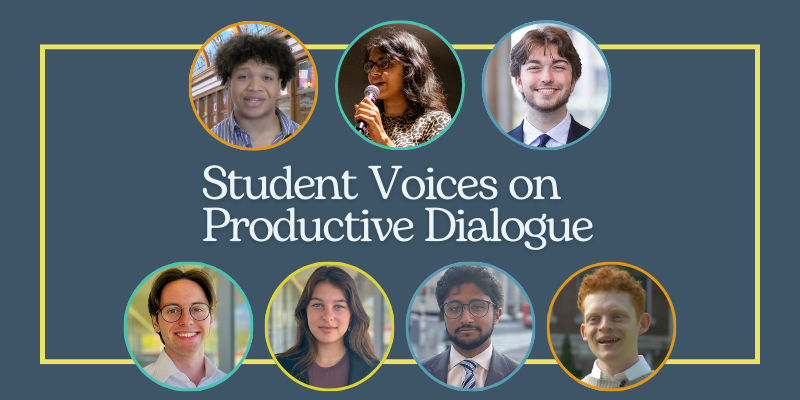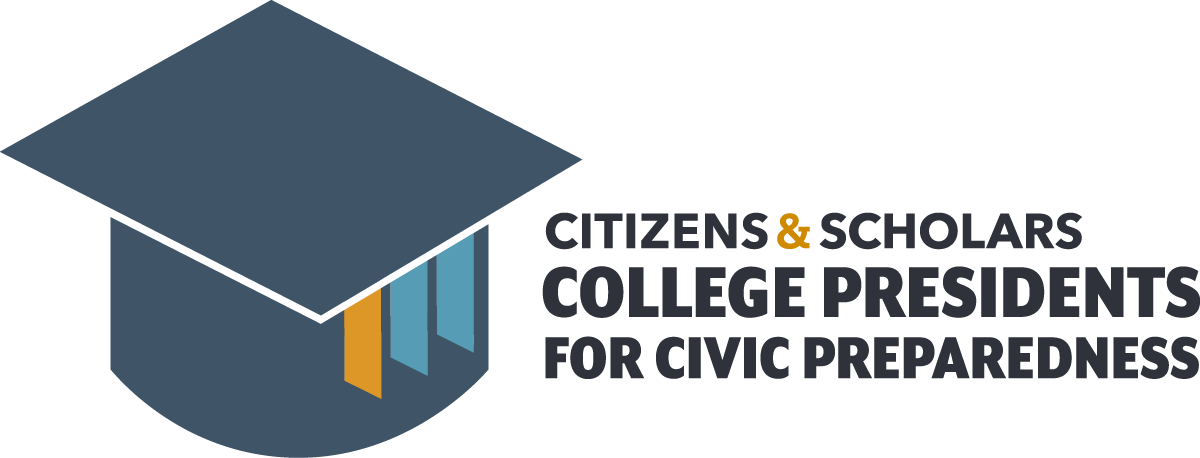Unscripted Student Voices Part Two

Hear from the second round of students leading the charge on campus productive conversations:
Stetson University
At Stetson University, values aren’t just words—they’re brought to life every year during Values Day when classes are canceled to reflect on personal growth, intellectual development, and global citizenship. But 2024’s theme pushed the conversation even further: What Should Stetson’s Values Be? It sparked a campuswide discussion, encouraging the Stetson community to challenge and reimagine the university’s guiding ideals. A staff member, faculty member, and student share what makes this tradition so special.
A student’s take on what makes Values Day unique: Bruno Soto, Senior:
My experience participating in the Values Day productive dialogue session was noticing a series of very thoughtful conversations that persisted throughout the whole event. In the four hours that we were there, we never waned on meaningful conversation, nor did we grow passive in our responses. Everyone at my table wanted to actively share what they were thinking.
While we mostly got along with what everyone at my table had to say, there was some friction when it came to discussing Stetson’s commitment to the international student community. The criticism came from a European international student, who argued that domestic students remain in the dark about the struggles of being an international student, and that a change in this would mean a lot to her. While I did disagree with her on how well Stetson cares about international students (I think we care a lot, enough to connect them to resources like financial aid and healthcare), I did recognize that my knowledge of them comes from me going out of my way to understand them, as opposed to Stetson highlighting the international student experience and helping us appreciate them more for being here. This is why I appreciate Values Day, because we find a rare opportunity to look into ourselves to ask why we believe what we do as a community and how we could better integrate our beliefs into practice through discussions with each other.
Learn more.
Rollins College
Joseph Pool, Rollins College ’26 founded Breaking Bread to help students find common ground and foster meaningful conversations through connections over the dinner table. Inspired by culinary diplomacy—a practice throughout history of using food to unite people—Pool started the student club as a faculty/student research project after taking several food-related courses with religion professor Yudit Greenberg. The club launched with 80 students at its first dinner event and has doubled in size, gaining support and grant funding. Breaking Bread is not only creating space for productive conversations but also empowering students to step up, inspire their peers, and make a difference.
Hear Joseph Pool be interviewed about the work by local news, WESH2 News Orlando.
Video credit: Rollins College, YouTube channel
Read more.
Ohio Wesleyan University
Ohio Wesleyan University is taking a bold step to ensure its community knows how to engage—not just argue. In 2024, the university announced a groundbreaking initiative: every student, faculty member, and staff member would have access to civil discourse training. But what does that look like in practice? Hear firsthand how a biology professor, student, and academic advisor are taking what they’ve learned and applying it to their studies, careers, and everyday interactions.
Hear from senior Timothy Page on skills he learned to navigate difficult conversations.
Denison University
For many college students, orientation is full of icebreakers, campus tours, and speeches about school traditions. But at Denison University, incoming classes are experiencing something different: a debate. The goal is to model productive conversations about divisive issues from a student’s very first moment on campus. Denison organized a debate for the Class of 2028 on the question: Should colleges and universities reinstate SAT/ACT requirements for admission?
Hear from first-year student Lucy Doyle ’28 on how participating in the debate was an eye-opening experience:
“Participating in the debate reminded me of the importance of keeping an open mind, even when you feel strongly about something. Throughout the debate, I found myself questioning my own preconceived notions and considering ideas I hadn’t thought of before.”
Lucy saw the debate as an introduction to Denison’s culture:
“The debate introduced me to the kinds of students we have on campus here at Denison. Everyone who participated was engaged and passionate about their opinions on the topic. Though the debate was not centered upon a controversial topic, I could tell that students were making an effort to acknowledge and respect opinions different from their own, a skill that is crucial in today’s increasingly polarized political climate. It demonstrated to me that Denison students are intellectually curious and passionate about learning, making me excited to engage in classes and extracurriculars with them.”
Learn more.
American University
At American University, students, faculty, and staff prioritize productive conversations about difficult topics through Dialogue Across Differences, an ongoing series fostering a more inclusive and connected campus. Gathering in small groups, participants from all corners of AU embrace challenging discussions guided by facilitators. A student-produced documentary by Giovana Roskosz Reis offers an unfiltered look at campus perspectives on civil discourse. Through candid interviews, students share their thoughts on the current climate at AU and the question: how do we build an inclusive community where belonging and voice are not just words but lived and felt experience across campus?
Hear from students on how productive dialogue builds a more inclusive campus:
There is a necessity for, you know, having uncomfortable conversations, especially in today’s society, especially when you are at a university. I mean, that should be—I would even argue—the mission is to engage in dialogue that sometimes is going to make you feel uncomfortable, that you’re not going to know how to, you know, how to navigate those waters. But at the end of the day, I think it’s fair to say that that’s the strength of it all, is that when you are in those uncomfortable spaces, you grow. –Michael McGee-McCoy
In this environment, I don’t think we need to be tiptoeing around the hard conversations. I think this is the place to learn to engage with other perspectives, and to learn to empathize and communicate compassionately. I think the only way forward in a lot of these global conflicts and just general progress is that we need to be able to hear each other first. Nothing’s going to change if we can’t hear each other and this needs to start here. –Carla Grinstead, MA
Explore AU’s Dialogue Across Difference student video.
Trinity University
In a time of deep political and social divides, where does real conversation begin? At Trinity University, it starts with an essential but often overlooked skill: listening. Through The Conversation initiative, Trinity is taking bold steps to foster meaningful discussions on campus through workshops, debates, and classes. At the heart of this effort is a course titled ‘Listening,’ co-taught by President Vanessa Beasley, the Provost, and Associate Provost. In this class, students are learning to move beyond echo chambers, confront their own biases, and embrace the tension of nuanced discussions.
Hear from students in their own words.
